Alumni Archive 2017
December 2017
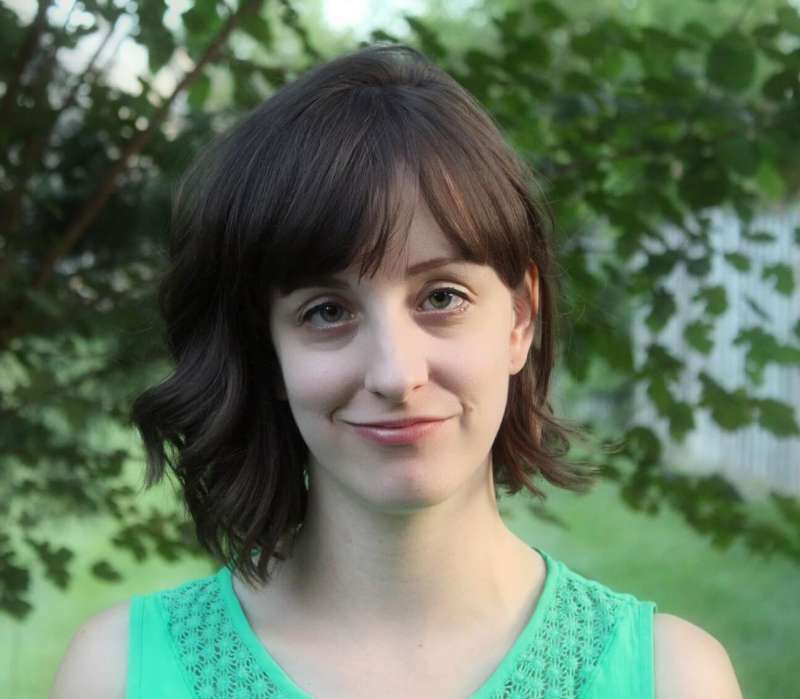 Name: Kaitlyn May
Name: Kaitlyn May
Major, Minor: English (Creative Writing), Spanish
Year Graduated: 2012
Job Now: Interlibrary Loan Manager at Hood College
What have you been up to since graduation? A little more than a year after graduating, I got married on Shepherd’s campus, in Reynolds Hall. My husband and I bought a house and moved to Frederick, Maryland, and I started part-time in the library at Hood College. I also substitute taught during that time, while working on my Master’s in Library and Information Science online through the University of South Florida. I’ve been travelling; last year we went to Japan. And recently we adopted a retired racing greyhound, Maisie.
What is the best/most interesting part of your job? I love searching for the resources students and faculty need to do their research; it feels like non-dangerous detective work. It’s fun to reach out to other libraries, sometimes in other countries, and work out how we can help each other. And it’s great to be around college students and help them grow and see what they’re passionate about and be involved in that work, even in a small way.
What has been your favorite/most memorable on-the-job moment? There was a library that wanted an article from an old journal, but they didn’t have the date, or the title—just a vague description. A colleague helped me flip through back issues, scouring every article until we found it. It turned out, the other library user was the child featured in the photo in the article, and he had lost his copy of it. He asked his librarian for my information so he could personally thank me and tell me how much it meant to him.
How did our program help you prepare for your current job? I think about things that my professors in the Department of English and Modern Languages said every day. Writing is a big part of my job, and everything I write runs through the filter of their teachings. Now that I’m in higher education, I try to model what I always saw in the faculty: the kindness, enthusiasm, and open-mindedness that make students want to work with you.
What advice would you give current students? It can be easy to find a niche and settle in to it, but college is the best time to try as many different things as possible. If you have even a vague interest in something, try it. It may not lead to a career or change your life, but it could give you a different perspective and add depth and richness to your experience.
______________________________
November 2017
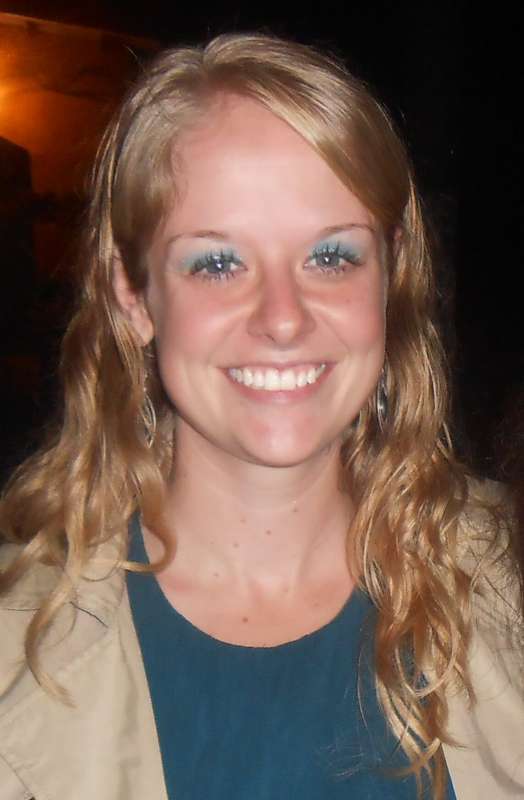 Name: Sarah Crickenberger
Name: Sarah Crickenberger
Major: Secondary Education with a Concentration in Spanish
Year Graduated: 2011
Job Now: Founder/President—Ministerio Familia de Promesa
What have you been up to since graduation? After graduation, as I’d been planning all throughout college, I moved to Honduras to work as a missionary, primarily with the socially at-risk population. I started by assisting in administrative needs for a long-established, non-profit ministry in Tegucigalpa. Because they work primarily with street kids, impoverished families, and gang members, I was given many opportunities to work in child sponsorship feeding programs, government-run juvenile delinquent centers, and street ministry with food distribution. After volunteering at a government-run home for at-risk youth, I became a foster mom to former street kids with drug addictions. I supported nine young people in a drug rehabilitation program, and I fostered two teenagers in my home. Since then, I started a Honduran non-profit called Ministerio Familia de Promesa, which currently supports former street kids and drug addicts in their educational endeavors. This year, one of our kids, a former drug-addicted street kid, will graduate high school. His mother died last year from ongoing illness, and he never had the opportunity to finish his studies before because he has always been the bread winner for his siblings. Another one of our kids, who has nine siblings and comes from a background of alcoholism, is in his second semester of college, studying to be a lawyer. This past year, I helped some family and close friends start a US-based non-profit called GodSend, Inc. with the purpose of equipping, supporting, encouraging, and sending more missionaries throughout the world. A few months ago, I got married to Raúl, my Honduran complement, who keeps me grounded and dreaming all at the same time. Since he is a small business owner, we’ve been able to work together to provide employment for some of the young people in our program and other at-risk youth.
What is the best/most interesting part of your job? As a follower of Jesus, I got to a place where I asked myself, “Is this seriously it?” I was tired of religion as a system of rules or as a routine of church-going or Bible-reading. I was also tired of the concept of success as being measured by a dollar amount or by a title. I didn’t want a normal life. Everyone has his or her own individual journey and personal convictions. I just knew personally that Jesus was actually a very revolutionary person who lived an extraordinary adventure of selflessness and love. I believed that if Jesus is real and if his love is real, my life had to reflect that radically in my decisions of how I spend my time here on earth and how I interact with others. So, the best part of my life is that I have the joy of living that adventure. So far, it’s been truly heart-breaking and has pushed my limits in loving, forgiving, healing, serving, etc., but I am constantly challenged, always learning even through my failures, and blessed to see a very real Jesus where all else has failed.
What has been your favorite and/or most memorable on-the-job moment? I have inspiring stories (unknowingly helping a teenager leave a life of prostitution and only finding out about it later), language mix-up stories (accidentally asking for something pornographic in an office store because of a vocabulary failure), eating-weird-food stories (cow stomach soup, cow udder, and chicken feet, anyone?), and cultural difference oddities (total strangers playing with my hair in public places without asking just because they’re not used to seeing blondes). I have too many to pick a favorite.
How did our program help you prepare for your current job? The program greatly helped in my comprehension and fluency of Spanish through the classes. Through the Spanish program and the aid of Dr. Berenschot, I was able to study abroad in Mexico on scholarship, an option I’d never even considered because I didn’t think I could afford it. The education department, classes, and field work gave me the skills and confidence to develop my own curriculum for teaching classes here where resources are limited. I had an amazing student teaching experience. My supporting teacher and I became dear friends. She’s like another mother for me and has even brought teams of her own students to serve on short-term missions here. My time at Shepherd, especially as a resident assistant, prepared me for working with all different kinds of people under pressure but with wisdom. And, my capstone, which was also greatly supported and aided financially by the Honors Program, gave me the opportunity to do some research that changed my life on a personal level. I was so fortunate in my decision to go to Shepherd.
How has speaking another language helped you in your career and life overall? My entire life depends on being able to speak Spanish. My husband doesn’t speak English. My foster kids only speak Spanish. I was able to jump into cultural learning and social activity better when I moved here because I came already being able to speak the language. Speaking Spanish has become more than a skill; it’s become a part of who I am and how I see the entire world.
What advice would you give current students? Truly take advantage of the opportunities presented during your time at Shepherd. This is a season of life where you will have opportunities for community and making new friends handed to you readily. Developing real friendships after college requires much more effort and is still such a need. Take risks on things that matter. I found out so much more about myself and my interests by putting myself in jobs, environments, and classes that I wasn’t sure I would like or would be able to do well. Be compassionate and dare to see the best in people even when they don’t deserve it. Never stop learning. It doesn’t have to be in a formal classroom environment, but never stop pursuing growth. It’s part of the beauty of being human.
______________________________
October 2017
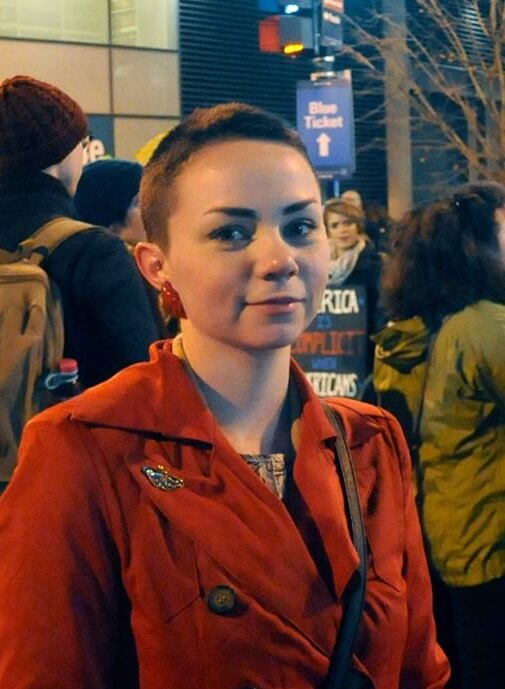 Name: Emily Daniels
Name: Emily Daniels
Major, Minor: English (Creative Writing), Journalism
Year Graduated: 2015
Job Now: City Editor at The Journal Newspaper in Martinsburg
What have you been up to since graduation? I pretty much immediately moved to Martinsburg and started my job as a state government and general assignment reporter at The Journal newspaper, and I have been here since.
What is the best/most interesting part of your job? There are so many wonderful and interesting aspects of my current job, but interacting with all types of different people and being put into situations that have challenged me are extremely rewarding. I have improved my writing skills exponentially, but I have also learned a lot about myself and the human condition in the process. I like hearing people tell me their stories and trying to justify them with the written word, or being at a meeting or listening to a politician speak and crafting that into something digestible for anyone and everyone reading the paper. Having access to credible information is extremely important, especially right now, and it makes me feel like I’m making a difference when I can share in the dissemination of that. My job has also taught me humility and understanding. Regardless of what I think of a particular story, it will always be important to someone; therefore, it has to be important to me. Plus, I just like the adrenaline rush of a deadline-driven environment. No day is ever the same.
What has been your favorite and/or most memorable on-the-job moment? I keep revisiting this story, but when I first started reporting, I was given the assignment of interviewing a woman who would soon be celebrating her 100th birthday. I drove to her home (she still lived at home!) and interviewed her with a little help from her friend (she could walk with a walker, but she was completely blind and had trouble hearing, so she needed assistance with certain things). I could not believe the sharpness of her mind. She could spell out names and rattle off addresses and talk about her experiences like they happened yesterday. It was just absolutely phenomenal, and it was one of the first instances that really reinforced why I chose the path I had. I also enjoyed being able to cover last year’s state legislature and traveling to D.C. for the presidential inauguration.
How did our program help you prepare for your current job? There are not enough words to describe the English program at Shepherd. When I entered college, I was painfully shy and awkward, and I would have died if someone asked me to call someone on the phone for an interview, let alone interview him or her in person. Being in classes that made me feel comfortable and having professors who made me feel so welcome in an unfamiliar environment did wonders to shape me into the person I am and give me confidence for future endeavors. While college cannot completely prepare anyone for a job, as I think on-the-job experience that you can’t really obtain elsewhere is extremely important, it certainly gave me the tools to be able to excel in any type of work environment. I am still in touch with many of my professors, and I cannot imagine a better college experience.
What advice would you give current students? Probably my biggest piece of advice is to take advantage of the resources you have right in front of you. Don’t ever feel too embarrassed to approach your professors during their office hours and go the extra mile to make sure your work is the best it can possibly be. Speak up in class! I still regret not talking more or sharing my feelings because I thought I would sound stupid or I didn’t feel 100 percent confident in what I thought about saying. Own your commentary, but also listen to what others have to say and be open to learning always. Also, be respectful to your professors. Read when you are supposed to read. Put effort into your assignments. And build relationships with your professors. They are beautiful people and wonderful mentors. Also, get involved with literary extracurricular activities. Definitely try writing for The Picket or submitting a piece of writing to Sans Merci. I hope your time at Shepherd inspires you never to settle for anything mediocre.
______________________________
September 2017
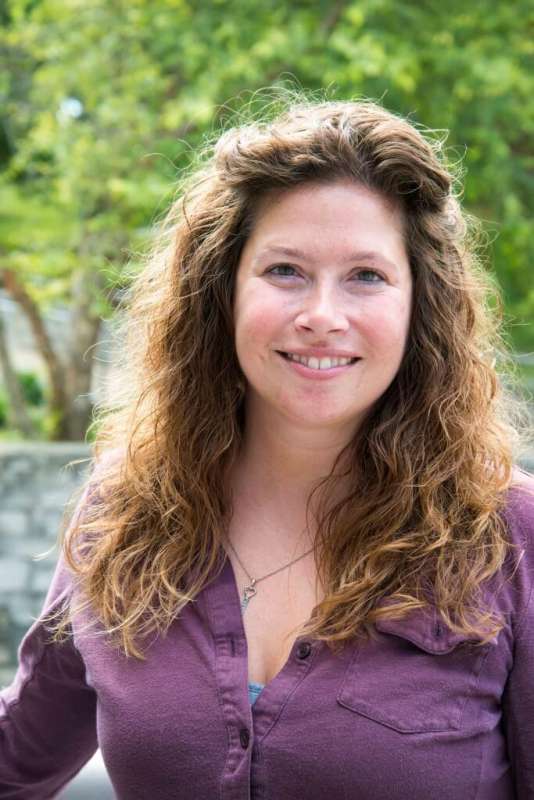 Name: L. Michelle Baker
Name: L. Michelle Baker
Major, Minor: English, Accounting
Year Graduated: 1998
Job Now: Founder and Principal of the Conservation Writing Pro
After graduation, I briefly went into accounting and quickly realized what a terrible idea that was for someone with a passion for literature. So I headed for graduate school with one idea in mind: get paid to read! Be careful what you wish for, right? Student essays aren’t quite what any of us has in mind when we think about reading, but I read an awful lot of them. (You can take that adjective however you like.) I also found out that “getting paid” looks different when you’re in graduate school, especially when you’re helping your husband start a home business and raising two stepdaughters while commuting 5 hours a day—yeah, you read that right. Martinsburg to northeast DC is a bitch.
The 9 to 5 grind isn’t exactly an option. So you get creative. For me, that meant getting online. I type fast, 125 wpm fast. So I started doing transcription. Send me an audio file, I send you a written transcript. I actually asked my Nana for an iPod for my birthday so I could free my hands to type. I made a lot of money off that little blue sucker. Most of the files I got were from entrepreneurs teaching other people how to be entrepreneurs. So at the same time I got a Ph.D. in English, I was getting a crash course in business. Except this was the real deal. There was no theory here: these were real people making a living from home using the internet, building websites, and writing blogs.
I graduated in the fall of 2008 in the middle of the worst financial crisis our nation has seen since the Great Depression. I went on the market at a time when 40% of the jobs were pulled from the MLA between October and January. Big research states like Florida, Texas, and Massachusetts were under a hiring freeze. In two years, I got three interviews and one offer. I said no. And I quit my job as an adjunct instructor.
I’m not here to tell you that a degree in English is not worthwhile. I’m certainly not here to say that you can’t get a job with it. If there’s one thing that the Department of English and Modern Languages at Shepherd taught me, it’s flexibility. Being an English major doesn’t just open doors; it puts the universe at your feet. It’s up to you to understand how to capitalize on that.
Six months after I left academia, Conservation Writing Pro emerged, the combined result of my English education, my business experience, and a newfound love of our world’s precious natural resources, courtesy of the National Conservation Training Center. As the Conservation Writing Pro, I teach environmental scientists how to write more clearly. It’s a skill they desperately need, given the fact that they are scientists, not English majors, so they struggle to write clearly. They are intelligent, well educated, and passionate about the work they do. Serving them is a gift.
As founder and principal of the Conservation Writing Pro and her sister company, EnviroEdits, I listen to problems scientists have communicating their message clearly, and I help them find solutions. I develop curricula, such as Keys to Transparent Communication, Writing with Clarity, and Argument for Scientists. I edit technical reports and dissertations. I consult with government agencies about technical and regulatory documents and help them produce writing guidance for their employees. And I recently published my first book, Writing in the Environmental Sciences: A Seven-Step Guide.
Once upon a time, I remember sitting in my little cubicle in Knutti, with a stack of papers in front of me in which students said, repeatedly, they believed a work of literature was about this, or that, or the other. I put my head down and wondered how I could help students realize they needed to prove their opinions. I came up with what I thought was a dumb little acronym: HEAT (Hypothesis, Evidence, Analysis, Thesis). I hoped it would help. Nearly ten years later, I sat in a government training center and watched an Assistant Regional Director teach that acronym to a group of experienced field biologists. She explained how important it was that they connect the dots and show how their interpretation of the evidence led them to a specific conclusion. I had to leave the room so I could cry in private. I never expected a lesson that I created to have that kind of longevity. To know that something so simple helps people do their work more easily: that’s a gift.
______________________________
August 2017
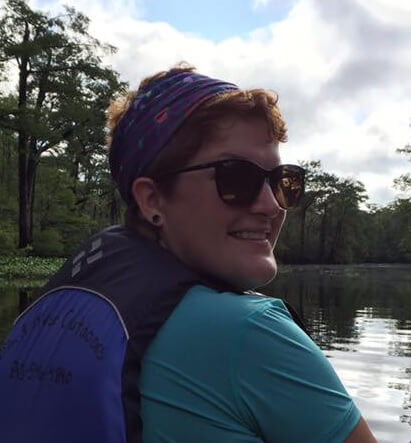 Name: Cara Schildtknecht
Name: Cara Schildtknecht
Major, Minor: B.A. in English and B.S. in Environmental Studies with a concentration in Aquatic Science
Year Graduated: 2011
Job Now: Waccamaw Riverkeeper with Winyah Rivers Foundation in Conway, South Carolina
What have you been up to since graduation? After graduation, I served in the US Peace Corps from 2011 through 2013 in Ghana, West Africa. I served as a Natural Resource Advisor to the Agumatsa-Afadjato Conservation and Ecotourism Center. While there I helped train our local tour guides and manage the center. I also taught science at the local high school and served as the advisor for several school groups. Upon returning to the States, I enrolled in a graduate program at Coastal Carolina University for Coastal Marine and Wetland Studies. I studied microbial water quality in the Grand Strand, South Carolina and graduated with my Master’s degree in May of this year.
What is the best/most interesting part of your job or what you are doing now? The best part of my job is engaging with citizen scientists who monitor the waters of the greater Winyah Bay watershed. Because we are a small nonprofit, we rely on community members to be our eyes and ears on the water. I have always believed that environmental preservation starts at the community level, and we are proving that in my adopted watershed. The most interesting thing about using citizen scientists and relying on the local community is the oral history. Everyone has a story about the river and hearing those stories is the best part of my job.
What has been your favorite and/or most memorable on-the-job moment? On my first official paddle as the Waccamaw Riverkeeper, I was paddling along talking to this little kid. He was a motor mouth, but in the best way. He was telling me all about the river and the animals he had seen while paddling. I asked him if he knew why the water in the Waccamaw was called blackwater. That set him off. He launched into a lecture on how blackwater was the result of leaves and pine needles falling into the water and decomposing. He told me it was like tea. And then, as we paddled on, he said, “If you come over to my house, I could make you some tea.” I was struck by the sincerity of his lecture and his invitation to tea. I hope that his love for the river continues as he grows, because he will be the future of our mission to protect fishable, swimmable, drinkable waters.
How did our program help you prepare for your current position? In my current position, I am responsible for writing articles for newsletters, grant proposals, and comment letters among other types of documents. The English program at Shepherd University helped me hone my skills in order to become a better writer. As a scientist, I have the responsibility to convey technical concepts to the general public. Writing is a highly valued skill in the science world, and I believe I would not have gotten to where I am now without my degree in English from Shepherd.
What advice would you give current students? Get out of the library and go jump in the river. The area around Shepherd University is excellent for outdoor recreation. Explore! Go tubing or paddling on the river, go hiking on the Appalachian Trail, visit Harper’s Ferry and Antietam. I spent a lot of time in the library working on papers, but I always took time to get outside. I think a good balance of work and play is important, and it will make your time at Shepherd all the more enjoyable. Take advantage of it while you can.
______________________________
July 2017
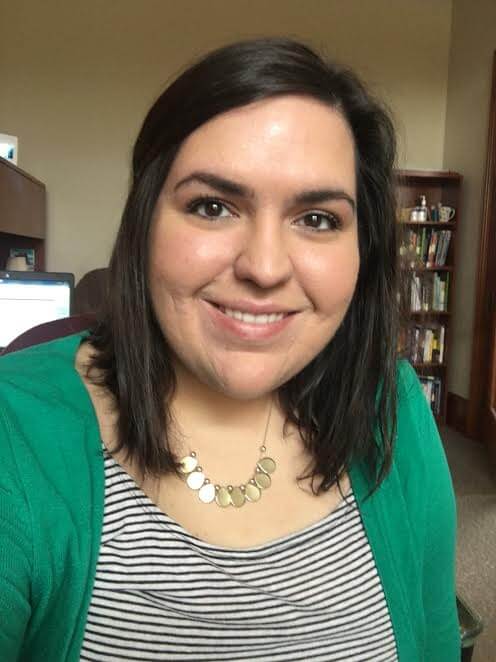 Name: Betsy Kozak
Name: Betsy Kozak
Major, Minor: English (Literature), French
Year Graduated: 2014
Job Now: Educational Materials Specialist at American Public University System
What have you been up to since graduation? I saved up and took a couple of road trips after graduation. I got to practice my French in Quebec City and Montreal. I also made a trip up to Massachusetts to visit all of the Transcendentalist sights we talked about in the American Literature classes. (The Orchard House was my favorite.) After getting some of the travel bug out of my system, I started applying for full-time jobs, and I eventually landed at APUS. Most recently I have been working on graduate school applications to pursue a Master of Library and Information Science.
Most interesting part of your job? In my position I have been able to learn a bit about the inner workings of a university library. Being able to see all the work that goes into making information available and easily accessible to students has been very interesting.
Favorite/most memorable on-the-job moment? In my position I get to speak directly with lots of students, and we have all sorts of people calling in for assistance. The most memorable interactions are those super friendly callers who end up wanting to chat about things well beyond textbooks and library resources.
How did the program help you prepare for your current position? The written and oral communication skills I gained in the Department of English and Modern Languages have been invaluable in the workplace. It really is true what we learned in the capstone course—the skills gained with an English degree can be applied across the board and benefit just about any career path.
What advice would you give current students? Do all of your assigned readings! You probably won’t ever have another time in your life where your main responsibility is to read interesting things and then talk about them with a group of thoughtful people. I would recommend enjoying this luxury for as long as you can.
______________________________
June 2017
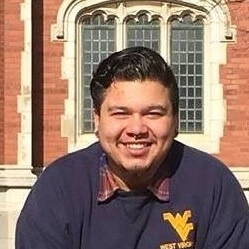 Name: Jeffrey Josue Acosta
Name: Jeffrey Josue Acosta
Major, Minor: Spanish, Music
Year Graduated: 2014
Job Now: Graduate Student pursuing a Master’s degree from the University of Central Oklahoma in Latin American History and researching El Salvador around the time of the civil war
What have you been up to since graduation? I was a middle school Spanish 1 and 2 teacher in Annapolis, Maryland from 2014 – 2016. Once I graduate I plan to apply to a few doctorate programs in either Spanish Literature, Ethnomusicology, or History. I do plan to return to teaching public school in the inner city.
What is the best/most interesting part of your job? My favorite thing about teaching is the joy and excitement I can instill in a group of students. The native students learn how to write Spanish properly and refine their speaking, and the non-native students gain confidence in speaking aloud. They also learn history, culture, politics, literature, and nonverbal communication skills all while learning Spanish.
What has been your favorite and/or most memorable on-the-job moment? My favorite memory teaching was last Christmas I was teaching my 8th grade Spanish 2 students about holiday celebrations in Mexico. I found a traditional song they sing and played it for the students, and I joked that I would have them sing it. The students protested the idea, so I decided to make it a competition: whoever sang the loudest would win a prize. The students were more than happy to sing this traditional Mexican Christmas song then.
How did our program help you prepare for your current job? Dr. Ellzey and Dr. Suárez were amazing in assisting me with a graduation plan. I was able to study abroad in the winter, completed an independent study in linguistics, and was even able to student teach for a semester with Shepherdstown Middle School. I learned so much from this program 3 years ago, and I am still using what I learned in my Master’s research now.
How has speaking another language helped you in your career and life overall? Being bilingual has opened so many doors in my career. Having a strong résumé and interview skills is terrific, but the hidden ability to communicate with 19+ other countries, broaden customer service skills, and provide a different viewpoint is wonderfully beneficial. I bring a different point of view to teaching with the ability to relate an idea in two languages.
What advice would you give current students? Don’t take the program lightly. When I graduated, I was the only Spanish major to graduate but got 4 offers to become a full-time Spanish teacher in Maryland within a month. This program is amazing. The professors will guide you to the path you want to study. I used my music minor with my major to complete a senior capstone on Manuel de Falla; I analyzed his Siete Canciones Populares Españoles in a musical and cultural way. I am using that research from my undergrad to come up with a unique thesis topic about the evolution of art and literature during the time of revolutions. The program may be smaller than other schools, but it will get you where you need to go, and beyond.
______________________________
May 2017
 Name: Turner Watts
Name: Turner Watts
Major, Minor: English, Education
Year Graduated: 2013
Job Now: 6th – 8th Grade English Teacher Old Town Academy in San Diego, California
What have you been up to since graduation? Following graduation in May of 2013, I did a lot all at once. My wife and I got married in June of that same year and decided to pack up and head west. We moved to San Diego with only what could fit in our cars and a few months’ savings. I was not able to land a job in San Diego for the 2013 – 14 school year, so I took a position as the 8th grade Language Arts teacher at a charter school in Los Angeles. The commute from San Diego to Los Angeles coupled with a difficult student body and it being my first year teaching just about defeated me. Luckily I landed a job in San Diego the following fall as the 6th – 8th grade language arts teacher at a small charter school called Old Town Academy. I’m currently living happily ever after.
What is the best/most interesting part of your job? The most interesting/best part of my job is working with middle-school-aged students. I think this age group is often misunderstood and underappreciated. I learn something new every day. It’s an amazing age . . . just don’t expect them to remember where they put their homework.
What has been your favorite and/or most memorable on-the-job moment? We have a poetry contest each spring, and I always love seeing my students up on stage reciting amazing poetry with such passion!
How did our program help you prepare for your current job? I think it’s the appreciation for learning that I developed at Shepherd and the ability to approach literature with an open mind. The hands on time that I had in the local schools was critical. There is not substitute for experience.
What advice would you give current students? Teaching English is hard, but if you are able to adjust and constantly reflect (focusing on what went right), it’s more rewarding than you can imagine.
______________________________
April 2017
Name: Jeff Jarina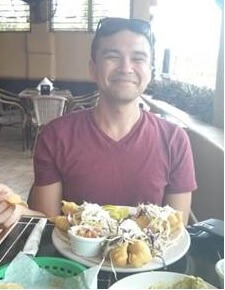
Major, Minor: English, Journalism
Year Graduated: 2011
Job Now: Legal Marketing Editor
What have you been up to since graduation? I worked for Disney for a little while, found the right career, moved into the city (Baltimore), got hitched to someone amazing, and I’m gearing up to get myself a dog and a grad degree.
What is the best/most interesting part of your job? My job is to make sure our writers don’t write anything that could get us into trouble with the law (particularly financial law). It sounds straightforward, but there’s enough nuance in language and the law that every sentence I tackle at my job ends up being a puzzle. I have to rearrange words and swap out nouns and adjectives to avoid any potential lawsuits. It sounds a bit dry, but the constant sentence analyses and the debates with copywriters make the day go by quickly.
What has been your favorite and/or most memorable on-the-job moment? I watched a few of our people get chased out of a Japanese shrine during a live broadcast—despite being told several times that it was a bad idea.
How did our program help you prepare for your current job? We parsed language every day in the English program—whether it was jokes and puns during English Honors Society meetings or week-long, in-depth analyses of William Carlos Williams’ “The Red Wheelbarrow”—there wasn’t a day where I didn’t play with words or think about how they can be interpreted. As it turns out, the world’s looking for people who can find the right word or tell you everything you need to know about a sentence.
What advice would you give current students? 1) Read more. I know you technically have to read every day, but there’ll be days down the road where you won’t have the time any more. 2) Surround yourself with smart and preferably kind folks. And I mean genuinely kind and unselfish people. If you’re lucky, they’ll be smarter and kinder than you and will help you get through a lot in your life. 3) Listen to your professors. Ask them, even the ones you don’t agree with, questions. They know a heap of stuff that’s worth knowing, and you don’t have that much time to learn it. 4) Schooling gets you the interview; extracurriculars get you the job. 5) The Rams Den has (or had) a steak and cheese thing. Get it with double meat and double cheese and fried onions . . . basically get two and put them together. 6) Do a midnight run to Krumpe’s Do-Nuts and get a cup of peanut butter icing. 7) Exercise, I guess.
______________________________
March 2017
Name: Tyler Ayers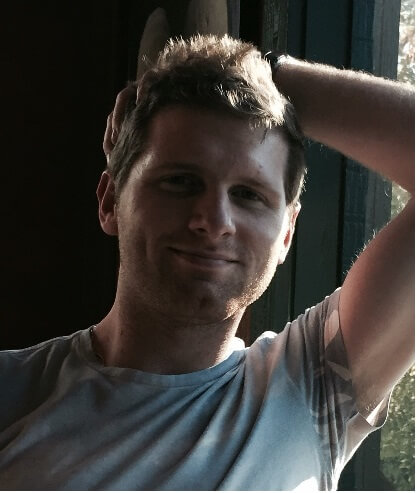
Major, Minor: Spanish, Psychology
Year Graduated: 2013
Job Now: High School Spanish Teacher. (I was a Flight Attendant for United Airlines for a very brief time and lived in New York City.)
What have you been up to since graduation? Traveling, working, and attending graduate school at West Virginia University School of Social Work
What is the best/most interesting part of your job? Sharing my experiences about Shepherd and my travels abroad, bringing in authentic foods for my students to sample, helping students develop their strengths, and instilling an everlasting desire to be more culturally cognizant.
What has been your favorite and/or most memorable on-the-job moment? My favorite on-the job moment was when I instructed my class through the process of making Paella. Students prepared, cooked, and served Paella to their peers and several teachers.
How did our program help you prepare for your current job? The Modern Languages program at Shepherd is small, but mighty! I had three foreign language instructors—Dr. Suárez, Dr. Berenschot, and Dr. Jarman—all of whom are superb and connect well with their students. Shepherd provided me the opportunity to travel to Costa Rica and Spain. Without the Study Abroad Office, it would have been much more difficult to find a program and university abroad. Being able to travel often has allowed me the opportunity to share stories and knowledge with my students.
How has speaking another language helped you in your career and life overall? When I worked for United Airlines, I often found myself speaking Spanish to passengers and colleagues because they were more comfortable with their first language. Sometimes, I would speak my very broken French, too. I think by being able to communicate and comprehend with as many people as possible, it helps create true neighbors and friends without walls and borders!
What advice would you give current students? Enjoy it! Do not rush your undergraduate life away. Find your niche! Savor every minute of life at Shepherd—phenomenal students, extraordinary faculty, and a remarkable community. Be courageous! Travel as much and for as long as you possibly can. Be open-minded! Try as many new opportunities as you possibly can.
______________________________
February 2017
Name: Stephan Antoine Viau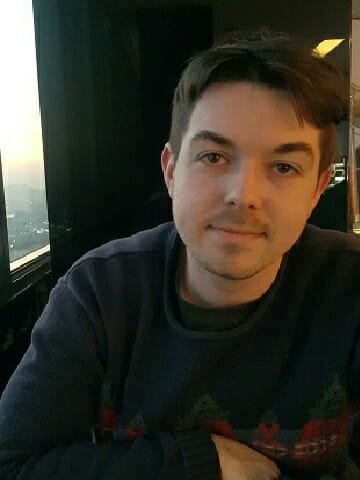
Major, Minor: English (Creative Writing), Education
Year Graduated: 2013
Job Now: Head Native English Teacher at a private academy in Seoul, South Korea
What have you been up to since graduation? In some ways, graduation seems like it was just yesterday, but, I guess, in reality, a lot of things have happened since 2013. In August of my graduating year, I applied for the Peace Corps and to teach English abroad in South Korea. By December I was accepted into both programs and had a huge decision to make. In the end, I turned down the Peace Corps. It’s not everyday that the Peace Corps receives withdrawal letters from candidates who worked tirelessly to be accepted, but a large amount of debt from university weighing down on me worried me too much to do volunteer service for two years. I decided, however, that if I chose to teach in Korea as the alternative, I would have to make of it everything I could have made from serving with the Peace Corps. I would have to delve into learning the language, read the literature, volunteer anywhere I could in my spare time, and try, as much as possible, to integrate. I think I’ve done most of those things.
What is the best/most interesting part of your job? The best part of my job is definitely working with my students. As much as I try to teach them English through examples from Western culture or through my experiences in Korea, my students teach me about what it means to grow up here. Despite being horribly overworked due to the ridiculously high competitiveness of Korean society, the students come to class curious about me, wanting to be able to communicate with me about their stresses, their friendships, their parents, and their goals. For many students in Korea, teachers are as present in their lives as their parents are, and sometimes more, due to how many hours they spend in classrooms each day. Teachers and students learn to be around each other and appreciate each other in the same way families do.
What has been your favorite and/or most memorable on-the-job moment? Students love Halloween in Korea. It’s a Western holiday that they obsess over more than people ever would in the States. At my academy, Halloween is the one day each year when the students don’t have to do regular classwork. Instead, the teachers prepare games for the students to win candy prizes. Everyone wears a costume, and the central hallway is turned into a catwalk for the students and teachers to model their outfits. Last year, along to blaring K-pop music, the teachers performed an impromptu dance on the runway that was caught on camera by most of the students. More than six months later, the students are still not letting us live that down. They bring it up everyday.
How did our program help you prepare for your current job? The English program at Shepherd University was indefinitely valuable. A huge part about pursuing any liberal arts degree is learning tolerance for opinions other than your own. The English faculty at Shepherd didn’t just teach students to tolerate other opinions though. The faculty encouraged opinions outside of their own. When a student brought up a potentially ludicrous interpretation of a text, professors went along with it—asked the students to test the limits of their theories and the texts. There is no wrong answer, they said, so long as you can support it. I think I employ this approach everyday in my classrooms. I don’t ask my students to share my opinion, but I ask them to form their own when we do debate topics or speeches. I only require that they can support their ideas with real evidence. It’s made better thinkers out of all of my students and me.
What advice would you give current students? Don’t feel infallible. Everyone is wrong sometimes. Even the most open-minded individuals harbor prejudices they didn’t even know they had. Some basic things I thought were common sense, like how to queue for a bus, aren’t the same abroad. There are cultural and historical reasons for the way things are in every place. Traveling and living abroad aren’t always leisurely. You’ll learn there’s more than one way to tie a shoe, more than one way to sing the ABCs. You’ll learn something about yourself when these strange, new things are presented to you. Relish the fact that your way is not the only way.
______________________________
January 2017
 Name: Lilli Bing
Name: Lilli Bing
Major, Minor: Double Major in English (Literature Concentration) and History
Year Graduated: 2010
Job Now: Social Studies, World History, and US Government Teacher for ESL students at a high school in Northern Virginia
What have you been up to since graduation? After graduating from Shepherd, I spent two years as a Peace Corps Volunteer in Azerbaijan. I worked as an English as Foreign Language teacher in the town of Oguz, nestled in the Caucasus Mountains. After returning to the US, I taught adult ESL students while working on my Masters of Education at George Mason University.
What is the best/most interesting part of your job? All teachers will answer this question the same way, I’d imagine, but my students are both the best and the most interesting part of what I do. My kids have been through a lot to get to the US, and when they get here, they’re faced with a whole new set of challenges. Despite all these barriers, though, my students are the bravest, hardest-working people I’ve ever met. I feel honored and proud that I get to work with them. Also, they’re hilarious and constantly make me laugh.
What has been your favorite and/or most memorable on-the-job moment? When I was having a hard day at work, one of my students noticed and said, “Ms. Bing, it’s okay. Tomorrow is a new day, and we must have hope and look to the future. You must be positive.” This—coming from a student who works a full-time job after school to support his family and who has been through more in his 17 years than I can imagine—blew me away and taught me the power of perspective and positivity.
How did our program help you prepare for your current job? My education at Shepherd (in both the History and English and Modern Languages departments) prepared me exceptionally well for graduate studies and gave me a solid foundation in writing and literature that has informed my work ever since. Beyond that, my studies taught me how to think about, question, and analyze the world around me. Shepherd made me a lifelong learner and explorer.
What advice would you give current students? Take advantage of the fantastic faculty working to help you at Shepherd! As cliché as it sounds, this is a time for finding out who you are and where you’re going; seek out the many voices that can help you on that journey.